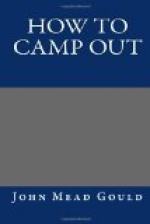You had better carry butter in a tight tin or wooden box. In permanent camp you can sink it in strong brine, and it will keep some weeks. Ordinary butter will not keep sweet a long time in hot weather unless in a cool place or in brine. Hence it is better to replenish your stock often, if it is possible for you to do so.
You perhaps do not need to be told that when camping or marching it is more difficult to prevent loss of food from accidents, and from want of care, than when at home. It is almost daily in danger from rain, fog, or dew, cats and dogs, and from flies or insects. If it is necessary for you to take a large quantity of any thing, instead of supplying yourself frequently, you must pay particular attention to packing, so that it shall neither be spoiled, nor spoil any thing else.
You cannot keep meats and fish fresh for many hours on a summer day; but you may preserve either over night, if you will sprinkle a little salt upon it, and place it in a wet bag of thin cloth which flies cannot go through; hang the bag in a current of air, and out of the reach of animals.
In permanent camp it is well to sink a barrel in the earth in some dry, shaded place; it will answer for a cellar in which to keep your food cool. Look out that your cellar is not flooded in a heavy shower, and that ants and other insects do not get into your food.
The lumbermen’s way of carrying salt pork is good. They take a clean butter-tub with four or five gimlet-holes bored in the bottom near the chimbs. Then they pack the pork in, and cover it with coarse salt; the holes let out what little brine makes, and thus they have a dry tub. Upon the pork they place a neatly fitting “follower,” with a cleat or knob for a handle, and then put in such other eatables as they choose. Pork can be kept sweet for a few weeks in this way, even in the warmest weather; and by it you avoid the continual risk of upsetting and losing the brine. Before you start, see that the cover of the firkin is neither too tight nor too loose, so that wet or dry weather may not affect it too much.
I beg you to clean and wash your dishes as soon as you have done using them, instead of leaving them till the next meal. Remember to take dishcloths and towels, unless your all is a frying-pan and coffee-pot that you are carrying upon your back, when leaves and grass must be made to do dishcloth duty.
CHAPTER VII.
Marching.[7]
It is generally advised by medical men to avoid violent exercise immediately after eating. They are right; but I cannot advise you to rest long, or at all, after breakfast, but rather to finish what you could not do before the meal, and get off at once while it is early and cool. Do not hurry or work hard at first if you can avoid it.
On the march, rest often whether you feel tired or not; and, when resting, see that you do rest.




